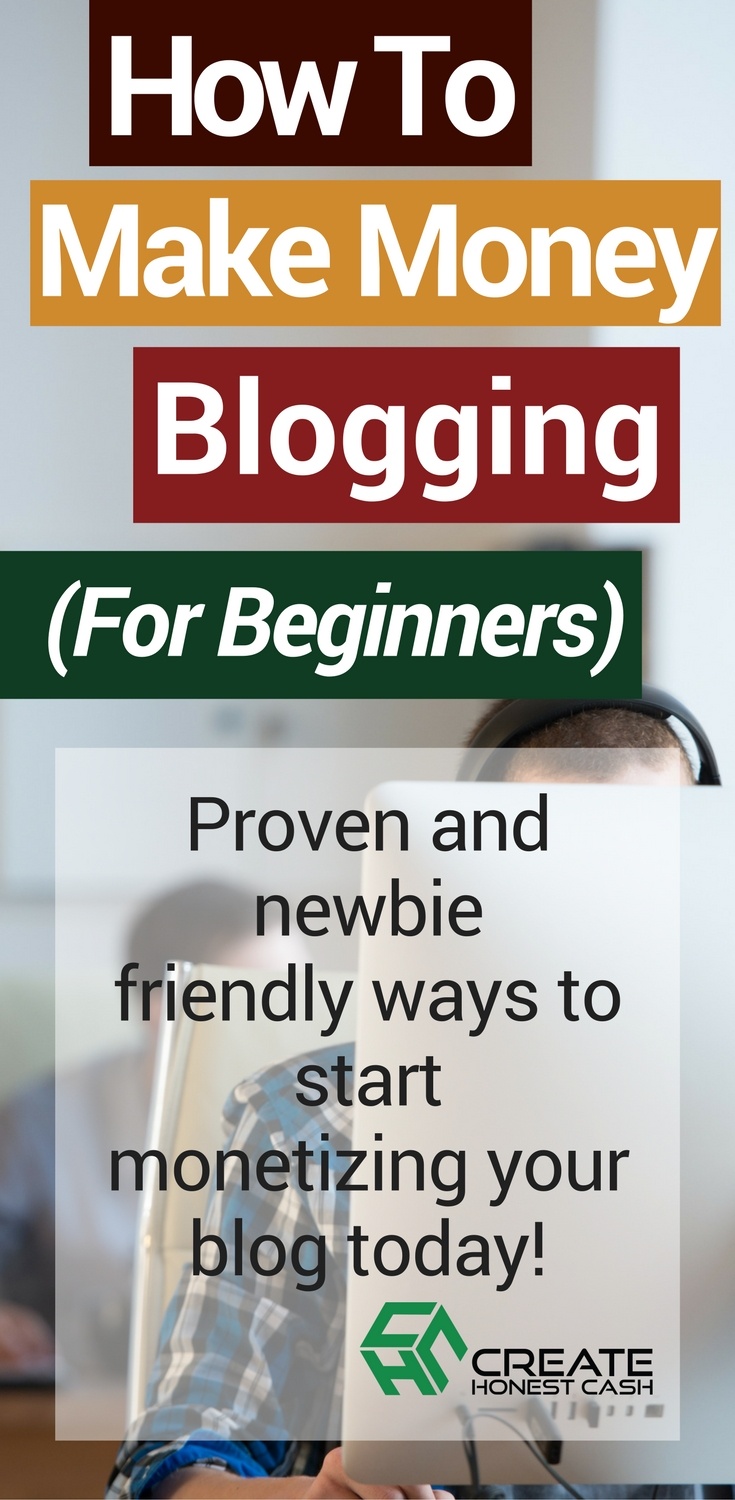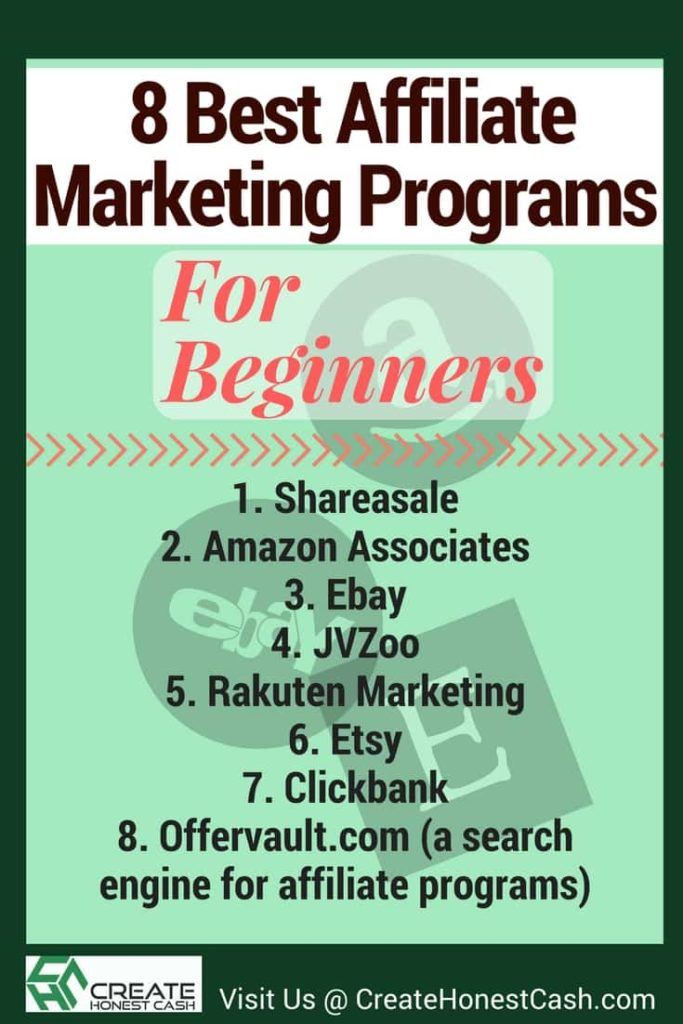- You are here:
- Home »
- Blogging for beginners »
- How To Make Money Blogging For Beginners

 You can start making money today with these free beginner-friendly methods
You can start making money today with these free beginner-friendly methods
They do require work of course, but lots of people (even experienced bloggers) are employing at least some of these same techniques right now!
For this article, we will stick to the beginner-friendly methods of monetizing a blog or website. I’ll link to more advanced techniques and how to build a website at the bottom of this article.
Ads on your site
I really don’t recommend using any ads unless you already have allot of traffic. The few cents that AdSense will give you won’t be worth it without at least I would say about 25,000 website visitors per month or more.
Another way to do this is to sell ad space on your site yourself. For example, you place a menu item on your site’s header or footer that links to a page that tells people how much you charge per month for a banner ad or a certain sized ad placed in the sidebar or directly into your content somewhere. It’s completely up to you and you can charge what you want instead of relying on AdSense. Again for this to work you need traffic but we can discuss that in just a bit.
Sell your own product(s)
If you already have a product to sell, that’s great, especially if it’s already selling. You don’t have to have a website to sell many products but it does help to get you many more sales than you would without one.
Content Marketing
This is where you lock part of your site’s content so only subscribers or paid members can access it. I’d say this is a medium to more advanced technique as you must have good content that people want to consume plus you will need some sort of payment gateway to take credit card/PayPal payments. For those of you who have already published great content and have a good amount of traffic coming in to your site then this could be an easier option than those starting from scratch with content marketing.
Affiliate Marketing

If you don’t have a product of your own, then affiliate marketing is a great place to start. If you’re not familiar with the term already, affiliate marketing is basically selling other people’s products through your website, social media or email. Sites like Amazon allow you to place a link with a unique number that identifies that a particular customer came from your site. When the customer buys through your link, you receive a commission.
Affiliate marketing is easy to get into for beginners. You don’t have to handle customer complaints or returns, you don’t have to take payments or house any inventory. All of that is taken care of for you by the websites you affiliate with. You simply send them the customer and receive a commission.
Commissions are typically low with physical products like the ones you find on Amazon.com (less than 10% of the purchase price). Digital products like e-books, courses, software and other things that are easily delivered over the web will get you much higher commisions… sometimes as high as 100% of the purchase. You can find these on Clickbank.com and JVZoo.com. How do they offer 100% commission you ask? They usually have an up-sell at the end of an e-book or affiliate links placed in it where they make their money back.
So, what subjects or niches work best with affiliate marketing? There are too many to mention them all but for a rule of thumb always make sure the subject you pick to write in is both of interest to you and there are products you can sell related to that subject that people are buying online. Affiliating with Amazon.com for example opens up a universe of potential products that you can offer to your website visitors.
Here is a short list of the more profitable subjects to start a blog in:
- Sleeping remedies
- “Mom” blogs (parenting info, baby products)
- Disaster preparedness
- Weight loss
- Making money online
- Tech product reviews
Email Marketing
Email marketing is the life-blood of most bloggers. About 80-90 percent of new visitors to almost every website never return to that site again. This is why email is a fantastic tool to both keep in touch with your audience and keep them returning to your new content. Also, having an email list is an asset. When you provide valuable information and insight (and don’t spam them), they don’t mind a promotion here and there and especially when related to your blog’s subject.
While email marketing might be beyond the scope of this article, I want to emphasize that it is important and you should start building as soon as you can and don’t put it off. Every online marketer that neglected using email from the time they started ended up regretting it later on.
Mailchimp is an email service you can start with for free if you have 2,000 or fewer subscribers, you can send up to 12,000 emails per month. I recommend starting with a better paid email service like ConvertKit, Aweber, or GetResponse from the start or as soon as you can afford it, their features are much more useful and worth the investment.
You Need Traffic
You can’t convert visitors into customers without traffic. As a new website you cannot possibly show up anywhere near the first page of search results on Google, so you won’t be able to get visitors from search traffic.
Most websites and blogs start out by introducing their content on social media platforms. This is a great way to get your content seen and start to get visitors. This is not just an effective way to get traffic but if you get or have a large following of targeted followers on social media, this could be all the traffic you need. I myself do not rely on Google or search engine optimization traffic. Most of my traffic comes from Pinterest and YouTube. The best social media platforms for traffic will depend on your subject niche, generally the best ones are YouTube, Pinterest, Twitter, Instagram, and Tumblr. You can get allot of views on YouTube because it’s the #2 most visited site on the planet. The platforms that you will find the easiest to gain followers on will be Pinterest, Instagram, Tumblr and Twitter.
Allow me if you will to offer a bit of advice from being a full-time blogger myself for 4 years… you will make mistakes, and allot of them. We all do starting out. The good news is that publishing online content is very forgiving. Anything from text to images and videos can be altered, changed or improved later. People expect honesty and relevant content that is informative and sometimes entertaining, but they don’t necessarily expect “perfection” all of the time.
Related Posts
Build A WordPress Website In 3 Easy Steps
